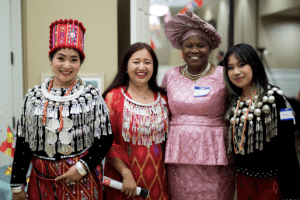By the Rev. Jonathan Kindberg, C4SO’s Diaspora Mobilizer
 In 2012, I helped establish something called Mosaic, a network of immigrant churches and churches seeking to partner with immigrants in the western suburbs of Chicago. This network helped put on a yearly equipping conference called “Mission on Our Doorsteps.” I revisited this formative experience when, this past year, I launched the Diaspora Network with C4SO and hosted a similar conference in Austin. Once again, I’ve been visiting, building relationships with and listening to immigrant churches and leaders in the Austin area and around the country. Much has changed in 10 years, and much has remained the same. I’ve learned many things from my work mobilizing immigrant churches, and I put together a list of 7 things churches can do to stay connected to this global movement of God.
In 2012, I helped establish something called Mosaic, a network of immigrant churches and churches seeking to partner with immigrants in the western suburbs of Chicago. This network helped put on a yearly equipping conference called “Mission on Our Doorsteps.” I revisited this formative experience when, this past year, I launched the Diaspora Network with C4SO and hosted a similar conference in Austin. Once again, I’ve been visiting, building relationships with and listening to immigrant churches and leaders in the Austin area and around the country. Much has changed in 10 years, and much has remained the same. I’ve learned many things from my work mobilizing immigrant churches, and I put together a list of 7 things churches can do to stay connected to this global movement of God.
1. Praise God for the renewal diaspora leaders and churches are bringing to the North American church.
While the broader White church in the United States seems to be in a moment of crisis, my own faith has been challenged, renewed and greatly encouraged by each encounter with immigrant leaders and churches. Marginalization, persecution (particularly in the case of refugees in their countries of origin) and poverty are often sources of purification and formation that shape immigrant churches and leaders to be God’s chosen vessels of renewal—like it was for Daniel in Babylon and for other Biblical diaspora heroes. These forces help provide resistance to the allures of power, privilege and wealth that have often assailed the broader White American church.
2. Develop and tweak new language that accurately describes immigrants and refugees.
We must be careful not to speak in ways that divide or prioritize one group over another based on how they arrived in the United States or their immigration status. Furthermore, we need language that accurately reflects immigrants’ new numerical reality and their tremendous influence and agency.
The development and increasing use of diaspora theology and language is a positive step in this direction. Words and phrases like “ethnic church,” “ethnic minority” or “minority” are inaccurate and need to be discontinued. Global diaspora churches and leaders (both first and second generation) are the new center of the Church in the United States in terms of who God is using. In many cases they are becoming, or already are, the numerical majority of active Christians in U.S. cities.
This has profound implications for how we think of the Church and of mission more broadly. Many diaspora churches are actually multiethnic, multicultural and multilingual in profound ways that “ethnic” White American churches find it difficult to comprehend. For example, many Latino churches are multiracial, multiethnic and multinational with Spanish language being the common denominator that brings them together across a wide range of differences. Many African churches also bring together people from several countries and languages, etc.
3. Invest in immigrant churches and leaders to impact the world both here and there.
I believe that partnering with diaspora leaders should be one of the key global mission strategies of most churches, but it requires a significant reworking/restructuring of current models that are still primarily built around one-way sending (“from the West to the rest”). Diaspora leaders and churches truly are remarkable forces for deep impact, doing much with very little in sacrificial ways. Almost every single immigrant church leader I’ve met this past year has been engaged in local cross-cultural ministry (not just among their own ethnic/cultural group), in addition to being engaged in global mission with very few resources or visibility.
4. Follow the immigrant church’s example of prayer and fasting, one of the primary gifts they bring to the broader U.S. church.
Almost every single immigrant church I’ve worked with this past year has a weekly (if not daily) rhythm of prayer and fasting. Prayer is the life of the Church and a reality the immigrant church lives and breathes. The pandemic forced many immigrant churches that hadn’t used much technology to begin using video conference tools such as Zoom. Many immigrant leaders now host prayer meetings for people from their ethnic/diaspora group around the world. For example, a Nepali pastor here in Austin has a daily prayer Zoom meeting that includes Nepali and Bhutanese Christians in 10-15 countries, including Israel, Iraq and the United Kingdom.
5. Humbly offer the gifts of the White church and the more established Asian, African American, and multi-ethnic churches.
These gifts must be humbly offered and correctly positioned under the leadership / direction of diaspora leaders and leaders of color. More established churches offer things like structure, stability, accountability, counseling/therapy, etc. These gifts and resources are particularly helpful for the 2nd generation of diaspora—again, if properly positioned under the leadership and direction of non-White leaders.
6. Repent of the pride and power found in much of the White U.S. Church.
I’ve found that it is very difficult to re-form White pastors and churches toward diaspora-centered ministry. The repositioning and reordering required for the White American Church and White American leaders—particularly those from larger and wealthier churches—can be perceived as a threat. The counter-cultural formation process is painful and difficult. The more power, the harder it is to develop humility and teachability and to move toward true mutuality. Power often expresses itself as a desire to “help,” “teach” or “meet needs,” all of which can be ways to continue to exercise power over and remain distant from others—in other words, to continue to “play God in the lives of the poor,” as Bryant Myers puts it. Tied to this is a deep lack of awareness of the “other” and the gifts they bring to the table.
7. Mobilize immigrants to welcome immigrants and refugees.
In my experience, most parachurch agencies continue to mobilize of White churches in local efforts to welcome immigrants and refugees, even though the majority of welcoming is actually being done by other immigrants themselves. Similarly, most mobilizing for global mission continues to center the sending of White American missionaries. This center of gravity is very difficult to resist unless it is named and undertaken with much intentionality. Few mobilizing efforts and very little communication truly centers immigrants and the immigrant church itself, furthering inequities in resources for mission. Immigrants are often invited to the table, but with little effort to join the tables immigrant leaders have already set themselves. The immigrant church (and the Black church as well) is a very diverse and varied body yet to be truly seen and valued in the broader immigrant and refugee conversation. For example, larger, older and more established immigrant churches—like many multigenerational, established Asian congregations—have great potential for glocal mission efforts, but are almost completely ignored and forgotten in the conversation around global mission, local church planting and welcoming of the stranger.
God truly is on the move through diaspora! I’m grateful for the privilege of partnering with and learning from leaders such as the Rev. Jose and Carmen Zurita in the Latino community and Drs. Samuel and Adora Obi in the Nigerian community. In upcoming blogs (and at our next conference) we hope to hear more of their stories and those of our leadership team.
Save the date for the Diaspora Network Conference July 28-29!
 The Rev. Jonathan Kindberg is resident clergy and a mission partner at Church of the Cross Austin, helping the church grow in their cross-cultural and community engagement in Northeast Austin. Jonathan has extensive experience in cross-cultural ministry in the United States and beyond. He has been instrumental in various ACNA initiatives related to engagement with the Latino community and church throughout North America. Jonathan is serving in Austin with a non-profit to connect churches to refugees and immigrants. Jonathan is mobilizing C4SO’s new Diaspora Network to support immigrant churches in our diocese.
The Rev. Jonathan Kindberg is resident clergy and a mission partner at Church of the Cross Austin, helping the church grow in their cross-cultural and community engagement in Northeast Austin. Jonathan has extensive experience in cross-cultural ministry in the United States and beyond. He has been instrumental in various ACNA initiatives related to engagement with the Latino community and church throughout North America. Jonathan is serving in Austin with a non-profit to connect churches to refugees and immigrants. Jonathan is mobilizing C4SO’s new Diaspora Network to support immigrant churches in our diocese.

